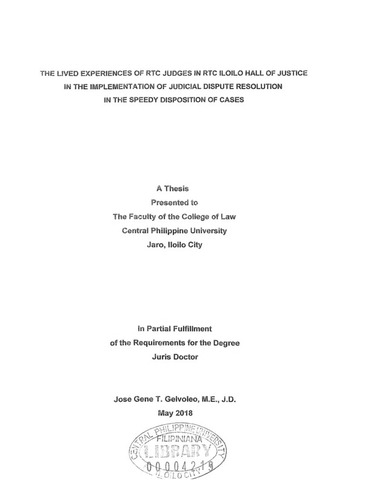The lived experiences of RTC judges in RTC Iloilo Hall of Justice in the implementation of judicial dispute resolution in the speedy disposition of cases

Page views
99,140Дата
2018Автор
Thesis Adviser
Defense Panel Chair
Share
Metadata
Показать полную информацию
Аннотации
This study was conducted to explore the lived experiences of RTC Judges of Iloilo Hall of Justice in the implementation of the Judicial Dispute Resolution (JDR) in the speedy resolution of cases in reference to A.M. No. 11-1-6-SC-PHILJA issued last January 11, 2011, providing guidelines for JDR. The tenor of the memorandum is to improve the quality of judicial services and access to justice to those who would opt not to go through the traditional, adversarial, and adjudicative litigation in the court. It has four-fold benefits: to unclog court dockets, achieve speedy disposition of cases, enhance access to justice, and humanize the judiciary. JDR is consonant with the mandate of the Constitution on the speedy disposition of cases and the provisions of the Civil Code, Title XIV on Compromises and Arbitrations (Articles 2028 and 2029).
JDR benefits the parties by affording them freedom to make their own arrangements to resolve their dispute under the leadership of the judge. Thus, judges move from the traditional role they play by taking off their robes and preside in the middle of the dispute. It covers peaceful settlements of dispute in civil case and also covers some criminal cases except those which cannot be compromised as discussed in this study with great weight. In criminal cases, only the civil aspect is submitted for JDR if settlement is reached. Action on the criminal aspect of the case will be determined by the Public Prosecutor, subject to the appropriate action of the court.
The Appropriate Research Design is qualitative based on interviews on the lived experiences of RTC judges in RTC Iloilo Hall of Justice in the implementation of the Judicial Dispute Resolution in the speedy disposition of cases. Results of the interviews, review of related studies and the provisions of the law are examined through narrative analysis.
The design used was qualitative descriptive phenomenology. Saturation point was attained after interviewing five (5) RTC Judges. Results revealed that parties to the case are given an opportunity to resort to J DR in applicable cases for it helps them in the speedy disposition of cases through peaceful and inexpensive resolution of disputes. Ultimately, JDR de-clog court dockets.
Описание
Abstract only
Suggested Citation
Gelvoleo, J. G. T. (2018). The lived experiences of RTC judges in RTC Iloilo Hall of Justice in the implementation of judicial dispute resolution in the speedy disposition of cases (Unpublished postgraduate thesis). Central Philippine University, Jaro, Iloilo City.
Type
ThesisТематика
Department
College of LawDegree
Juris DoctorShelf Location
Law Library 340.72 G283
Physical Description
vii, 113 leaves
Collections
- Juris Doctor [144]

